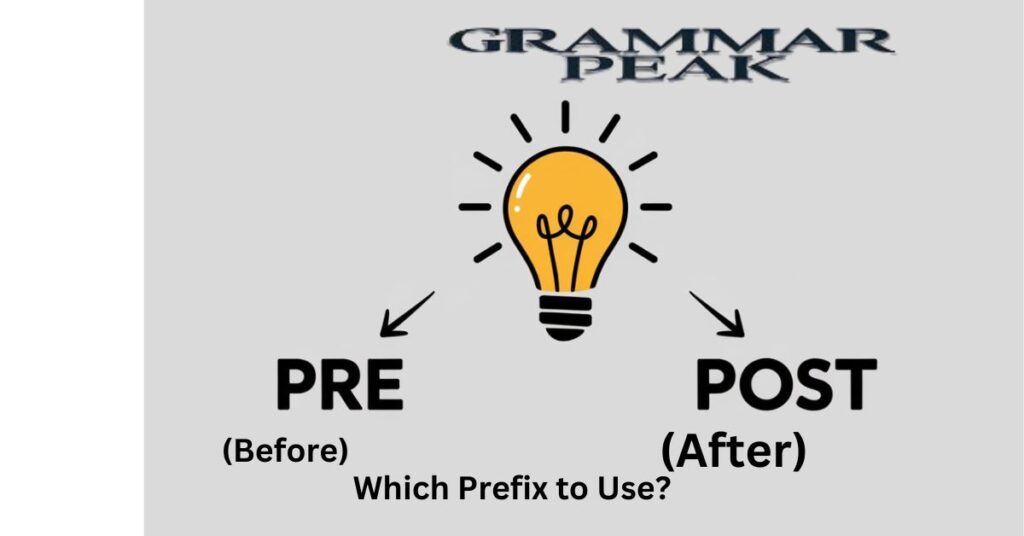In the English language, there are numerous such subtle distinctions that can change the meaning of a word. Such a distinction is between the prefixes ‘Pre’ and ‘Post’. These two little weapons, ‘Pre’ and ‘Post’, can really change the meaning of a word.
This article will cover an extensive study of Pre vs Post : Which Prefix to Use? Its origin, meaning, and applications will be thoroughly examined in daily usage.
Pre and Post: Tiny Words, Big Impact!
‘Pre’ and ‘Post’, while being miniature prologues or tiny epilogues to words, carry great significance. They are time indicators, hinting at whether an action or state is set to occur before or after a certain point in time.
For example, ‘Pre-order’ suggests ordering before the item is readily available, while ‘Post-game analysis’ indicates the analysis done after the game has concluded.
Read More About Pre vs Post: Which Prefix to Use?
Understanding Pre and Post:
In terms of grammar usage, ‘Pre’ and ‘Post’ are prefixes that come from Latin roots
Pre
- To ensure the bread bakes evenly, it’s essential to ‘Pre-heat’ the oven before putting the dough in.
- As ‘Pre-med students,’ they are required to complete certain courses before they can start their medical training.
- It’s recommended to ‘Pre-order’ the book now, so you’ll receive it as soon as it’s published.
- ‘Pre-requisites’ must be fulfilled before you can enroll in the advanced course.
- Before painting, it’s necessary to ‘Pre-treat’ the surface to ensure better adherence of the paint.
- She likes to ‘Pre-plan’ her weekly meals to maintain a balanced diet.
Post
- ‘Post-workout stretches’ are crucial to help muscles recover and prevent injuries.
- Due to unforeseen circumstances, they had to ‘Postpone’ the meeting to the following week.
- His ‘Post-game analysis’ offers insightful commentary on the team’s performance after the match.
- After the surgery, the patient received ‘Post-surgical care’ to aid in the recovery process.
- She posted a ‘Post-dinner selfie’ with her friends on social media.
- The ‘Post-mortem analysis’ of the project revealed valuable insights for future endeavors.
While Handy, Not Quite Antonyms:
Interestingly, while ‘Pre’ and ‘Post’ are often used to denote opposite timelines, they’re not exactly antonyms in language.
For example, ‘pre-requisites’ are requirements that must be met before something else can happen, while ‘post-surgical care’ refers to the care given after surgery. While they indicate opposite times, they do not have opposing meanings.
Let’s Get Practical!
The practical examples of ‘Pre’ and ‘Post’ are abundant in our everyday language.
A ‘Pre-heat oven’
- Before baking cookies, make sure to ‘Pre-heat the oven’ to the correct temperature.
- To achieve a perfect roast chicken, ‘Pre-heat the oven’ to 375 degrees Fahrenheit.
- The recipe calls for a ‘Pre-heated oven’ at 200 degrees Celsius for the cake to bake evenly.
- For a crispy pizza crust, ‘Pre-heat the oven’ to its highest setting before baking.
Pre-order
- Customers who ‘Pre-order’ the new book will receive a signed copy from the author.
- To ensure you get the latest phone model on release day, it’s best to ‘Pre-order’.
- The limited-edition sneakers are available for ‘Pre-order’ starting next week.
- ‘Pre-order’ your meal to avoid waiting during the lunch rush at the restaurant.
Pre-requisites
- To enroll in the advanced mathematics course, the ‘Pre-requisites’ include Algebra I and II.
- Before applying for the master’s program, check the ‘Pre-requisites’ to ensure you meet all the necessary academic requirements.
- The ‘Pre-requisites’ for the software development course include basic knowledge of coding and data structures.
- Some universities have strict ‘Pre-requisites’ for certain courses, such as a minimum grade in English for admission.
Pre-heat
- ‘Pre-heat’ your oven to 350ºF, which generally takes about 12-15 minutes, before starting to bake your cookies.
- If you’re baking a cake, ‘Pre-heat’ the oven to a higher temperature, say 450° F, which might take a bit longer due to the increased heat.
- It’s crucial to ‘Pre-heat’ the oven before cooking, as it ensures your food is cooked at the correct temperature from the start, leading to even cooking and better texture.
- When you ‘Pre-heat’ an oven, that sets the cooking temperature for your dish, so after pre-heating, keep the oven on at the same temperature for the duration of the cooking time.
You Might Be Pre vs Post: Which Prefix to Use?
Pre vs Post: The Differences Made Clear
Timeline:
- ‘Pre-production is the first stage in the filmmaking process, where scripts are finalized, and the cast and crew are selected.
- ‘Post ‘-production is the final stage in filmmaking, where the film is edited, sound effects are added, and the movie is prepared for distribution.
- In the ‘Pre-industrial era, most people lived in rural areas and worked in agriculture, while in the ‘Post-industrial era, people moved to urban areas and worked in service industries.
- ‘Pre’-COVID, many businesses operated primarily in physical locations, but
Function:
- ‘Pre’ Prefix: The prefix ‘Pre‘ is used to indicate something that happens before a certain event.
- ‘Pre’ signifies that caution is taken before a potential danger or risk occurs.
- ‘Post’ Prefix: On the other hand, the prefix
- ‘Post’ is used to denote something that happens after a certain event.
- ‘Post’ indicates that the examination occurs after death .
Remember:
- ‘preliminary’ refers to something that occurs before the main event, such as preliminary exams that students take before the final assessments.
- ‘postgraduate’ refers to studies or degrees pursued after completing an undergraduate degree, indicating that these studies happen after the initial degree is obtained.
- ‘pre-operative’ assessments are conducted before surgery, while ‘post-operative’ care is provided after the surgery has been completed.
- ‘pre’ in the phrase ‘pre-launch’ signifies activities that take place before a product launch, whereas ‘post-launch’ activities occur after the product has been introduced to the market.
Here’s a table illustrating the differences between ‘Pre’ and ‘Post’:
| Pre vs Post: The Differences Made Clear | Pre (Before) | Post (After) |
| General Meaning | ‘Pre’ denotes an event, condition, or state that occurs before another. | ‘Post’ indicates an event, condition, or state that happens after another. |
| Example 1 | Pre-Production: The process before actual production begins. | Post-Production: The process after the initial production ends (editing, special effects, etc). |
| Example 2 | Pre-Operative: Measures taken before a surgical operation. | Post-Operative: Care and treatment after a surgical operation. |
| Example 3 | Pre-Employment: The phase before someone is officially employed (interviews, background checks, etc). | Post-Employment: The phase after employment ends (exit interviews, pension plans, etc). |
| Example 4 | Pre-Launch: Activities done before a product/service is launched. | Post-Launch: Activities done after a product/service has been launched. |
| Example 5 | Pre-Season: The period before a sport’s official season begins. | Post-Season: The period after the official season ends. |
Origins of ‘Pre’ and ‘Post’
These prefixes have Latin etymology. ‘Pre’ comes from the Latin ‘Prae’, meaning before, and ‘Post’ comes from ‘Post,’
‘Pre’
The prefix ‘Pre’ has its roots in Latin, derived from the word ‘prae’, which means “before.” This etymological background highlights the prefix’s function in the English language, where it is used to indicate something that occurs prior to a specific event or time.
The adoption of ‘Pre’ into English can be traced through Old French and Medieval Latin, reflecting its long-standing presence in various languages and its consistent meaning related to precedence.
‘Post’
The prefix ‘Post’ originates from the Latin word ‘post,’ which translates to “after” or “behind.” This etymology underscores its primary function in the English language, where it is used to indicate events or conditions that occur following a particular point in time.
The word has been integrated into English through various channels, including Old French, which has helped maintain its consistent meaning related to the temporal sequence.In contemporary usage, ‘Post’ appears in a wide range of terms across different disciplines.
Examples in Context
Pre:
- ‘Pre-register’ for the conference to secure your spot and receive important updates.
- Make sure to ‘Pre-heat’ the oven before placing your dish inside for optimal cooking results.
- ‘Pre-approval’ for a loan can significantly speed up the home-buying process.
- It’s advisable to ‘Pre-plan’ your travel itinerary to make the most of your vacation.
- ‘Pre-pack’ your bags the night before your trip to ensure you don’t forget anything important.
- ‘Pre-screening’ applicants can help streamline the hiring process and find the best candidates.
- ‘Pre-emptive’ measures are essential in disaster management to minimize potential damage.
- Always ‘Pre-check’ your equipment before a presentation to avoid technical difficulties.
Post:
- ‘Post-workout’ stretches are crucial to increase your flexibility and aid muscle recovery.
- Incorporating a variety of ‘Post-workout’ stretches can help target all major muscle groups, promoting overall body wellness.
- Regardless of your workout choice, ‘Post-workout’ stretches are important to increase blood flow to the muscles, aiding in recovery and preventing stiffness.
- ‘Post-activity‘ stretching helps lengthen your muscles, which is particularly beneficial if you’re engaging in different forms of active recovery on alternate days.
- ‘Post-training’ stretches support muscle recovery and help avoid injury, releasing tightness and facilitating full-body stretches.
- A well-planned ‘Post-exercise recovery routine can significantly impact your fitness gains and sports performance, allowing you to train more effectively.
- ‘Post-workout’ recovery time built into your fitness routine can help avoid injuries and maximize the benefits from your muscle-building work.
- Light movement and stretching ‘Post-workout’ can promote blood flow, assisting in muscle repair and the removal of metabolic waste.
FAQ, S
What does the prefix ‘Pre’ mean?
‘Pre’ is a prefix derived from Latin, meaning ‘before.’
What does the prefix ‘Post’ mean?
‘Post’ is a prefix also from Latin, denoting ‘after.’
Can ‘Pre’ and ‘Post’ be used interchangeably?
No, ‘Pre’ and ‘Post’ cannot be interchanged as they denote opposite timelines.
How do ‘Pre’ and ‘Post’ affect the meaning of words?
‘Pre’ and ‘Post’ alter the meaning of words by indicating whether an action or state occurs before or after a certain point.
What are some practical examples of ‘Pre’ and ‘Post’ usage?
Examples of ‘Pre’ usage include ‘Pre-order’ and ‘Pre-heat,’ while ‘Post’ can be seen in ‘Post-game analysis’ and ‘Post-surgical care.’
Conclusion
Understanding the use of ‘Pre’ and ‘Post’ prefixes in English language can greatly enhance our communication. As we’ve seen in our Pre vs Post: Which Prefix to Use? comparison, these tiny words have a big impact!

Mason Blake is an experienced blogger with a passion for language and communication. With years of expertise in crafting informative and engaging content, Mason shares valuable insights on grammar and writing. His clear, concise, and reader-friendly approach has earned him a loyal following, helping readers sharpen their language skills and master the art of effective communication.








Thank you for your sharing. I am worried that I lack creative ideas. It is your article that makes me full of hope. Thank you. But, I have a question, can you help me?
Your article helped me a lot, is there any more related content? Thanks!
Thank you for your sharing. I am worried that I lack creative ideas. It is your article that makes me full of hope. Thank you. But, I have a question, can you help me? https://www.binance.info/bn/register?ref=UM6SMJM3
Can you be more specific about the content of your article? After reading it, I still have some doubts. Hope you can help me. https://accounts.binance.info/en-IN/register-person?ref=UM6SMJM3
https://jekyll.s3.us-east-005.backblazeb2.com/20241015-42/research/je-tall-sf-marketing-1-(91).html
This outfit’s intricate corded embroidery and
understated black skirt are a match made in heaven—just like your daughter and their soon-to-be
spouse.
https://digi74sa.sfo3.digitaloceanspaces.com/research/digi74sa-(190).html
Add a metallic heeled sandal or pump and also you’re good to go.
Whoa! This blog looks exactly like my old one! It’s on a completely different
subject but it has pretty much the same layout and design. Excellent choice of
colors!
Tremendous issues here. I’m very satisfied to see
your post. Thank you so much and I’m looking forward to contact you.
Will you please drop me a mail?
Here is my page: bclub la
https://digi55sa.netlify.app/research/digi55sa-(199)
“I said right then I would put on it one day,” she recalled.
https://storage.googleapis.com/digi462sa/research/digi462sa-(286).html
Reviewers describe it as very slimming and say the
beadwork is exquisite.
https://digi607sa.z44.web.core.windows.net/research/digi607sa-(322).html
Shop now through various retailers, including official on-line shops.
https://digi648sa.netlify.app/research/digi648sa-(191)
Some girls choose to wear a costume, whereas others
choose separates…and both are great options!
https://storage.googleapis.com/digi463sa/research/digi463sa-(178).html
Go for prints that speak to your marriage ceremony location, and most significantly, her personal fashion.
https://storage.googleapis.com/digi464sa/research/digi464sa-(244).html
Browse by scoop necklines or check out the strapless choices.
https://digi62sa.sfo3.digitaloceanspaces.com/research/digi62sa-(59).html
To make hers, mom JoJo Cohen turned to her close pal,
the late designer L’Wren Scott.
https://storage.googleapis.com/digi470sa/research/digi470sa-(456).html
So, go ahead, and let the pure shine of your dress converse quantity for you.
https://objectstorage.ap-tokyo-1.oraclecloud.com/n/nrswdvazxa8j/b/digi509sa/o/research/digi509sa-(47).html
You can also coordinate with the MOB to verify your choices complement
each other.
https://digi605sa.z12.web.core.windows.net/research/digi605sa-(217).html
Take this easy but fashionable knee-length marriage ceremony
visitor gown for the mother-of-the-bride.
https://digi606sa.z48.web.core.windows.net/research/digi606sa-(497).html
This mom wore a conventional hanbokwith floral and geometric embroidery to her daughter’s California
ranch wedding.
https://storage.googleapis.com/digi468sa/research/digi468sa-(247).html
Searching for off-the-shoulder necklines or long sleeves?
https://digi62sa.sfo3.digitaloceanspaces.com/research/digi62sa-(10).html
Oleg Cassini, completely at David’s Bridal Polyester,
spandex Back zipper; totally lined Hand wash Imported.
https://digi604sa.z31.web.core.windows.net/research/digi604sa-(390).html
A pink lace Erdem costume, embroidered with pink and crimson blooms,
paired completely with this modern mom’s
half-up, half-down coiffure.
https://objectstorage.ap-tokyo-1.oraclecloud.com/n/nrswdvazxa8j/b/digi511sa/o/research/digi511sa-(393).html
Moms who wish to give somewhat drama, contemplate vivid hues and statement features.
https://digi597sa.z1.web.core.windows.net/research/digi597sa-(26).html
If the marriage is outdoor or on the beach, then there’ll most probably be more leeway relying on the temperature and setting.
https://objectstorage.ap-tokyo-1.oraclecloud.com/n/nrswdvazxa8j/b/digi496sa/o/research/digi496sa-(370).html
Everyone is conscious of you are the bride, so don’t be concerned about your mother carrying white
or a full skirt alongside you.
https://storage.googleapis.com/digi467sa/research/digi467sa-(217).html
You ought to keep in mind the formality, theme, and decor colour of
the wedding while in search of the costume.
https://storage.googleapis.com/digi463sa/research/digi463sa-(254).html
As the mom of the bride, your function comes with massive responsibilities.
https://digi610sa.z9.web.core.windows.net/research/digi610sa-(426).html
Of course, you’ll find a way to play with colors of sequin outfits to kick off the look of your desires.
https://objectstorage.ap-tokyo-1.oraclecloud.com/n/nrswdvazxa8j/b/digi510sa/o/research/digi510sa-(196).html
While you don’t wish to look like a bridesmaid , it
is savvy to tie in your look with the texture and color
palette of the wedding.
https://digi51sa.ams3.digitaloceanspaces.com/research/digi51sa-(27).html
An event as special as your kid’s wedding ceremony does not come round every day.
https://digi60sa.fra1.digitaloceanspaces.com/research/digi60sa-(141).html
Here’s a tea-length mother-of-the-bride costume you presumably
can simply pull out of your wardrobe time and time again.
https://digi598sa.z8.web.core.windows.net/research/digi598sa-(498).html
Similar to the moms of the bride and groom, the grandmothers might wish to
coordinate with the wedding celebration.
https://digi611sa.z28.web.core.windows.net/research/digi611sa-(432).html
The distinction between these two robes is in how they are
selected.
https://digi64sa.sfo3.digitaloceanspaces.com/research/digi64sa-(229).html
It is also beneficial to avoid black dresses as these usually symbolize
times of mourning.
https://digi67sa.sfo3.digitaloceanspaces.com/research/digi66sa-(145).html
Whatever the situation, when you are ready to attend a wedding, you’ll wish to look your greatest.
https://storage.googleapis.com/digi461sa/research/digi461sa-(51).html
However, coordination is still essential for chic images on the big day.
https://storage.googleapis.com/digi472sa/research/digi472sa-(213).html
The fall colors are usually earthy and on the
darker facet, but always ask your daughter what she has in mind.
https://objectstorage.ap-tokyo-1.oraclecloud.com/n/nrswdvazxa8j/b/digi497sa/o/research/digi497sa-(240).html
A matching white choker topped off this mother-of-the-bride’s look,
which was additionally complemented by a classy low bun.
https://digi70sa.sfo3.digitaloceanspaces.com/research/digi30sa-(370).html
Adhere to the gown code, and look to bridesmaids or the marriage robe for guidance on daring patterns or embellishments.
https://objectstorage.ap-tokyo-1.oraclecloud.com/n/nrswdvazxa8j/b/digi510sa/o/research/digi510sa-(377).html
Talk to your daughter or future daughter- in-law to get a feel for
the visible she’s making an attempt to create.
https://objectstorage.ap-tokyo-1.oraclecloud.com/n/nrswdvazxa8j/b/digi509sa/o/research/digi509sa-(470).html
Give them glitz and glam in this allover sequin stunner.
https://objectstorage.ap-tokyo-1.oraclecloud.com/n/nrswdvazxa8j/b/digi496sa/o/research/digi496sa-(42).html
In general, you’ll do your greatest to avoid matching with the bridesmaids or the moms of
the couple getting married.
https://digi654sa.netlify.app/research/digi654sa-(43)
For the redwood location, it would be great to put on something in natural colours
like the 2 moss green outfits pictured.
https://digi67sa.sfo3.digitaloceanspaces.com/research/digi66sa-(382).html
Gold, black or navy shoes and equipment would look fashionable.
https://objectstorage.ap-tokyo-1.oraclecloud.com/n/nrswdvazxa8j/b/digi496sa/o/research/digi496sa-(177).html
Discover fashionable jumpsuits and dresses with complementing jackets,
fascinators, shoes and accessories to complete your look.
https://digi74sa.sfo3.digitaloceanspaces.com/research/digi74sa-(300).html
The beaded flowers down one aspect add a tactile touch of luxury to the column gown .
https://digi650sa.netlify.app/research/digi650sa-(317)
This gown is available in sizes 2 – 22 to suit quite so
much of body styles.
https://digi69sa.sfo3.digitaloceanspaces.com/research/digi69sa-(135).html
Browse our high alternatives and buy your favorite right
on the spot.
https://digi52sa.fra1.digitaloceanspaces.com/research/digi52sa-(401).html
When buying on-line enable time for supply and
any alterations to be made.
https://digi57sa.sfo3.digitaloceanspaces.com/research/digi57sa-(55).html
Exude Mother of the Bride magnificence in this stunning patterned robe from wedding guest dress powerhouse Karen Millen.
https://digi73-1sa.sfo3.digitaloceanspaces.com/research/digi73sa-(475).html
Beading in tones of blue, gray, and silver add dimension and sophisticated sparkle to this
flattering mesh column gown.
https://storage.googleapis.com/digi467sa/research/digi467sa-(177).html
If chic and complex is what you are going for, think about this sequined
ensemble from Alex Evenings.
https://digi650sa.netlify.app/research/digi650sa-(405)
Inspired by Old Hollywood glamour, it’ll match right in at a black tie wedding.
https://storage.googleapis.com/digi466sa/research/digi466sa-(46).html
Kay Unger’s maxi romper combines the look of a maxi gown with
pants.
https://digi650sa.netlify.app/research/digi650sa-(497)
Gone are the times when mothers of the bride had been anticipated to wear matronly clothes in washed-out shades of pastels or beige.
https://objectstorage.ap-tokyo-1.oraclecloud.com/n/nrswdvazxa8j/b/digi507sa/o/research/digi507sa-(8).html
Reviewers describe it as very slimming and say the beadwork is exquisite.
https://digi610sa.z9.web.core.windows.net/research/digi610sa-(288).html
And lastly, don’t fear about looking to only ‘age-appropriate’ boutiques.
https://digi72sa.sfo3.digitaloceanspaces.com/research/digi71sa-(341).html
Her mom, Rita, opted for this champagne-hued robe that was equally as ethereal.
Hello my friend! I want ultimateshop to say that this
post is awesome, great written and come with almost all significant infos.
I would like to see extra posts like this .
Wonderful goods from you, man. I’ve have in mind your stuff previous to and
you are simply too wonderful. I really like what you’ve received right here, certainly like
what you are saying and the way in which through which you are
saying it. You’re making it entertaining and you
still take care of to keep it smart. I cant wait to learn far more from you.
That is actually a tremendous site.
Feel free to visit my blog post; ultimateshop login
https://digi76sa.sfo3.digitaloceanspaces.com/research/digi76sa-(143).html
When first beginning to plan your mother of the bride outfit, look to the wedding
location itself for inspiration.
Right now it appears like BlogEngine is the preferred blogging
platform available right now. (from what I’ve read)
Is that what you’re using on your blog?
my site ultimateshop to
https://objectstorage.ap-tokyo-1.oraclecloud.com/n/nrswdvazxa8j/b/digi504sa/o/research/digi504sa-(31).html
This desert colored dress is perfect if what the bride wants is so that you can put on a colour nearer to white.
I do not even know how I ended up here, but I thought this
post was great. I don’t know who you are but certainly you’re going to a famous blogger if you are not already 😉 Cheers!
Here is my web site – ultimateshop vc
Howdy! This post could not be written any better! Going through this article
reminds me of my previous roommate! He always kept preaching about this.
I’ll send this information to him. Fairly certain he’ll have a great read.
I appreciate you for sharing!
my blog … ultimateshop ru
Good way of explaining, and nice piece of writing to take information regarding my presentation subject matter, which i am going to deliver in institution of
higher education.
my web page :: briansclub cm
It’s actually very complex in this active life ultimateshop to listen news
on Television, so I just use web for that reason, and take the most up-to-date news.
https://digi70sa.sfo3.digitaloceanspaces.com/research/digi30sa-(192).html
For the mom who likes to look put together and trendy, a jumpsuit in slate
gray is bound to wow.
These are in fact wonderful ideas in concerning blogging.
You have touched some pleasant things here. Any way keep up wrinting.
My blog post … bclub
https://digi73-1sa.sfo3.digitaloceanspaces.com/research/digi73sa-(400).html
With a mild fit on the hips, this gown is designed to flatter you in all the right places.
Incredible quest there. What occurred after? Take care!
Stop by my site briansclub cm
https://digi67sa.sfo3.digitaloceanspaces.com/research/digi66sa-(263).html
This outfit’s intricate corded embroidery and understated black skirt are a match made in heaven—just
like your daughter and their soon-to-be spouse.
https://storage.googleapis.com/digi467sa/research/digi467sa-(24).html
This additionally helps depart time for delivery in case the dress takes longer than expected to reach.
https://storage.googleapis.com/digi467sa/research/digi467sa-(184).html
Use the filters to type by silhouette, neckline,
material, and size.
https://objectstorage.ap-tokyo-1.oraclecloud.com/n/nrswdvazxa8j/b/digi503sa/o/research/digi503sa-(43).html
Try to enrich your coloring while coordinating with the
the rest of the bridal celebration to a point.
https://digi61sa.nyc3.digitaloceanspaces.com/research/digi61sa-(246).html
Opt for non-creasing, moveable fabrics corresponding to scuba or lace,
teamed with fashionable but sensible sneakers for that
added contact of glamour.
https://storage.googleapis.com/digi473sa/research/digi473sa-(119).html
A mid-length cocktail dress is an effective way to achieve a sublime look.
https://digi604sa.z31.web.core.windows.net/research/digi604sa-(393).html
The mom of the bride attire are available all different varieties of sleeves.
https://digi647sa.netlify.app/research/digi647sa-(211)
Maybe she envisions everybody sporting neutral tones, or maybe she prefers bold and brilliant.
https://storage.googleapis.com/digi473sa/research/digi473sa-(306).html
Celebrate their huge day in fashion with our Mother of the Bride or Groom outfits.
https://digi58sa.ams3.digitaloceanspaces.com/research/digi58sa-(426).html
That said, having such a broad variety of choices might feel slightly overwhelming.
https://digi56sa.sfo3.digitaloceanspaces.com/research/digi56sa-(445).html
We’ve always heard that mom is aware of finest, and if these mothers of the bride—and mothers of the groom!
https://digi657sa.netlify.app/research/digi657sa-(272)
So, you’ll need to wear one thing that doesn’t clash with the remainder of the group in photographs.
https://digi53sa.sgp1.digitaloceanspaces.com/research/digi53sa-(328).html
With over star reviews, you could be positive this dress
will exceed your (and your guests!) expectations.
https://digi652sa.netlify.app/research/digi652sa-(174)
It’s obtainable in three colors and in sizes 0-18 and shall be good for summer time, vacation spot, and bohemian weddings.
https://storage.googleapis.com/digi474sa/research/digi474sa-(279).html
This outfit’s intricate corded embroidery and understated black skirt are a match made in heaven—just like your daughter
and their soon-to-be partner.
https://storage.googleapis.com/digi467sa/research/digi467sa-(64).html
This embellishment on this gorgeous costume
provides a contact of magic good for any winter marriage ceremony.
https://storage.googleapis.com/digi463sa/research/digi463sa-(314).html
A pink lace Erdem costume, embroidered with pink and crimson blooms, paired completely with this trendy mother’s
half-up, half-down coiffure.
https://digi56sa.sfo3.digitaloceanspaces.com/research/digi56sa-(149).html
With over 5 years of expertise in bridal, she is an expert on all things trend.
https://storage.googleapis.com/digi460sa/research/digi460sa-(339).html
Do you favor to put on mild and ethereal colors or do you
gravitate toward darker shades?
https://storage.googleapis.com/digi477sa/research/digi477sa-(235).html
When in doubt, opt for slightly black dress—but make it
tremendous luxe.
https://storage.googleapis.com/digi464sa/research/digi464sa-(71).html
If you want your legs, you may want to go together with an above-the-knee or just-below-the-knee gown.
https://storage.googleapis.com/digi469sa/research/digi469sa-(362).html
They additionally create an elongating, slimming effect as they draw the eye up and down rather than across.
https://digi69sa.sfo3.digitaloceanspaces.com/research/digi69sa-(9).html
This hard-to-beat basic fashion is seamless for moms of all ages to flaunt an beautiful fashion statement on their daughter’s D-day.
https://digi47sa.nyc3.digitaloceanspaces.com/research/digi47sa-(20).html
From the trumpet reduce to the swirled-lace embroidery and the sheer bow at the again, this mother’s slate gown was all concerning the details.
https://digi653sa.netlify.app/research/digi653sa-(362)
Both the mother of the bride and the mom of the groom chose hanging robes
with embellishment and phantasm necklines for this out
of doors celebration.
https://digi648sa.netlify.app/research/digi648sa-(442)
Clean traces and a formed waist make this a timeless and chic
mother of the bride dress with a flattering silhouette.
https://storage.googleapis.com/digi461sa/research/digi461sa-(137).html
Try to enhance your coloring whereas coordinating with the the
rest of the bridal celebration to some degree.
https://digi65sa.sfo3.digitaloceanspaces.com/research/digi65sa-(455).html
Sort through our full selection of clothes to search out your perfect slot in many colors and any measurement.
https://digi610sa.z9.web.core.windows.net/research/digi610sa-(404).html
Peach, crimson, and gold introduced punchy shade to a traditional Indian sari.
Hi, i believe that i noticed you visited my weblog so i got here to go back the choose?.I am attempting to in finding
issues to enhance my site!I guess its ok to make use of some of your
ideas!!
my web-site :: bclub la
https://storage.googleapis.com/digi463sa/research/digi463sa-(426).html
Discover fashionable jumpsuits and clothes with complementing jackets, fascinators, sneakers and equipment to complete your look.
https://digi59sa.ams3.digitaloceanspaces.com/research/digi59sa-(86).html
This bride’s mother escorted her down the aisle in a
floor-length golden robe with a floral overlay.
Hey! This is my first visit to your blog!
We are a group of volunteers and starting a new project in a
community in the same niche. Your blog provided us
useful information to work on. You have done a extraordinary job!
my web-site … ultimateshop ru
https://digi599sa.z29.web.core.windows.net/research/digi599sa-(387).html
Opt for a well-cut, flowing sundress in a breathable
fabric—and pair with dressy sandals to pull
the look collectively (while nonetheless feeling snug on the sand!).
https://digi601sa.z45.web.core.windows.net/research/digi601sa-(458).html
She loves an excuse to strive on a veil, has a minor
obsession with flower crowns, and enjoys nothing greater than curating a killer
celebration playlist.
https://digi73-1sa.sfo3.digitaloceanspaces.com/research/digi73sa-(105).html
This dress’ dreamy chiffon cape feels ceremonial and refined, and is well eliminated
to reveal a slinkier metallic sheath beneath for dinner and dancing.
https://digi607sa.z44.web.core.windows.net/research/digi607sa-(485).html
This hard-to-beat classic fashion is seamless for moms of all ages to
flaunt an beautiful fashion assertion on their daughter’s D-day.
It’s really very difficult in this active life to listen news on Television, thus I simply use internet for that
reason, and obtain the most recent information.
My blog post: prozone login
I don’t think the title of your article matches the content lol. Just kidding, mainly because I had some doubts after reading the article.
https://objectstorage.ap-tokyo-1.oraclecloud.com/n/nrswdvazxa8j/b/digi498sa/o/research/digi498sa-(375).html
Trust us, with a enjoyable handkerchief hem and pretty flutter sleeves,
you will be getting compliments all night.
https://digi77sa.sfo3.digitaloceanspaces.com/research/digi77sa-(106).html
With palm leaf décor and many vines, green was a primary theme
throughout this charming and colourful South Carolina celebration.
https://storage.googleapis.com/digi460sa/research/digi460sa-(484).html
Look for cinched-in jackets that will not only disguise her wobbly bits,
but additionally help her change her look from day to nighttime.
https://storage.googleapis.com/digi471sa/research/digi471sa-(135).html
However, the graphic styling of the flowers provides the dress a modern look.
https://digi599sa.z29.web.core.windows.net/research/digi599sa-(231).html
With over 1,868 5 star reviews and coming in properly beneath $100,
this Gatsby type Maxi robe is certain to impress.
https://storage.googleapis.com/digi458sa/research/digi458sa-(111).html
This combination is particularly nice for summer weddings.
https://digi76sa.sfo3.digitaloceanspaces.com/research/digi76sa-(380).html
Then, let the formality, season and venue of the marriage be
your information.
https://storage.googleapis.com/digi476sa/research/digi476sa-(471).html
This mom of the bride wore a white tunic and skirt for a
boho-chic ensemble.
https://storage.googleapis.com/digi468sa/research/digi468sa-(394).html
Wear yours with grass-friendly shoes like block heels or woven wedges.
https://storage.googleapis.com/digi463sa/research/digi463sa-(429).html
Cream is another option or skirt and prime in a black and white mixture.
https://je-tall-marketing-871.fra1.digitaloceanspaces.com/research/je-marketing-(489).html
For a gorgeous look, choose a celebratory design featuring lace and lengthy sleeves.
https://je-tall-marketing-879.ams3.digitaloceanspaces.com/research/je-marketing-(29).html
Mother of the bride clothes need not feel frumpy or overly conservative!
https://storage.googleapis.com/digi458sa/research/digi458sa-(43).html
Modest meets insanely modern on this silky Amsale gown that includes a column silhouette
and off-the-shoulder neckline.
https://je-tall-marketing-877.ams3.digitaloceanspaces.com/research/je-marketing-(181).html
You should go for some shiny colours, or if
your daughter has a colour picked out for you then go along with that.
https://digi63sa.sfo3.digitaloceanspaces.com/research/digi63sa-(410).html
You may combine the monochrome twinset with white or black pants.
https://storage.googleapis.com/digi475sa/research/digi475sa-(172).html
Red Dress has some very beautiful and elegant attire,
and they are inexpensive.
https://je-tall-marketing-882.ams3.digitaloceanspaces.com/research/je-marketing-(430).html
You can discover an excellent selection right here and
they are nice high quality that won’t break the financial institution.
I have read so many content regarding the blogger lovers but this paragraph is really a
fastidious paragraph, keep it up.
My web-site findsome.ru
Wow! At last I got a website from where I be capable of genuinely
take valuable data regarding my study and knowledge.
Here is my blog post … find some
Can you tell us more about this? I’d love to find out more details.
Here is my site; findsome ru
https://je-tall-marketing-872.ams3.digitaloceanspaces.com/research/je-marketing-(357).html
This off-the-shoulder style would look great with a pair of strappy stilettos and shoulder-duster earrings.
you are actually a excellent webmaster. The site loading pace is amazing.
It kind of feels that you are doing any unique trick.
In addition, The contents are masterwork. you have performed a fantastic process on this subject!
Here is my web site – find some
Thank you, I’ve recently been searching for info approximately this topic for a long
time and yours is the best I have found out till now.
But, what in regards to the bottom line? Are you positive about the source?
Also visit my web blog … findsome cc
https://digi67sa.sfo3.digitaloceanspaces.com/research/digi66sa-(417).html
Don’t be afraid of something oversized—the giant bow of this robe will flatter small busts, and
make waists and arms seem petite as compared.
Hi there! Do you know if they make any plugins to assist with Search Engine Optimization?
I’m trying to get my blog to rank for some targeted keywords but I’m not seeing
very good results. If you know of any please share.
Kudos!
Visit my web blog :: findsome
https://je-tall-marketing-851.ams3.digitaloceanspaces.com/research/je-marketing-(484).html
It has a beautiful cut that enhances all the right places.
https://storage.googleapis.com/digi470sa/research/digi470sa-(278).html
There often aren’t any set guidelines in phrases of MOB outfits for the marriage.
Excellent goods from you, man. I have take
into accout your stuff prior to and you are just too wonderful.
I actually like what you’ve acquired right here, really like what you are saying and the best way in which you assert it.
You make it entertaining and you continue to take care of to keep it wise.
I can’t wait to read far more from you. This is really a terrific site.
Your article helped me a lot, is there any more related content? Thanks!
We are a group of volunteers and opening a new scheme
in our community. Your web site offered us with valuable info to
work on. You’ve done a formidable job and our entire community will be thankful to you.
Undeniably imagine that which you stated. Your favorite reason appeared to
be at the net the easiest thing to bear in mind of.
I say to you, I certainly get irked even as other people think about issues that they plainly don’t realize about.
You managed to hit the nail upon the highest as smartly
as defined out the entire thing without having side-effects , people can take a
signal. Will probably be back to get more. Thanks
My website … russianmarket
Call girls in Lahore Agency offer a wide selection of Hot Sexy VIP Call girls for incall service with free hotel rooms 24 7 come to Our Reliable & Trusted Call girls Agency, the best and most well-known Call girls in Lahore. We always offer 50% off our Escorts services. Cash Payment is Available. Our Call girls Escorts Agency are popular with people who enjoy having fun. They like beautiful partners and stay out all night.
We have Hot Sexy call girls in Lahore You can find Models, TikTok Stars, TV actress, Housewife Lahore call girls. Our hot call girls in Lahore will make your sexual dreams come true. Our service is rated 5 stars for providing high-class real call girls at affordable prices. We offer genuine pictures and phone numbers, ensuring delivery to your location within 25 minutes, saving you both time and money.
We have a wide range of High Class Lahore Call girls and Beautiful Real girl WhatsApp numbers with Photos available 24 7 to fulfill sexual desires.Our Best Call girls give sensual experiences to their customers. We always send real Cheap girls to treat our clients so that they feel safe. Our services will be fun for you, and our adult services will be easy for our customers and anyone who wants to join us. People love us because we offer the best Lahore Call girls Service at low prices, and our women do fun things for them.
Are you looking for the satisfactory Call girls Service In Lahore? As one of the best agencies for call ladies in Lahore, we offer quite a number sexual services. Call girls in lahore is the most famous Call girls Agency in Lahore and Pakistan.Our ladies are to be had for in-name and out-call services. You can e book our girls at any time of the day on the excellent price.
Launch into the epic galaxy of EVE Online. Forge your empire today. Create alongside millions of pilots worldwide. Begin your journey
Thanks for sharing. I read many of your blog posts, cool, your blog is very good.
Aw, this was a really nice post. Finding
the time and actual effort to produce a really good article… but what can I say…
I hesitate a lot and don’t manage to get anything done.
Also visit my site savastan cc
I got this site from my buddy who shared with me on the topic of this site and now this time I am
visiting this site and reading very informative posts at this
time.
My page … savastan0
It is perfect time to make some plans for the future and
it’s time to be happy. I have read this post and if I could I desire to suggest you few interesting things or advice.
Maybe you can write next articles referring to this article.
I want to read more things about it!
Also visit my blog post: savastan0
Hello, I believe your website might be having internet browser
compatibility problems. When I look at your website in Safari,
it looks fine but when opening in IE, it has some overlapping issues.
I just wanted to provide you with a quick heads up! Aside from that, wonderful website!
Also visit my web blog savastan0.tools
It is perfect time to make a few plans for the future and
it is time to be happy. I have read this submit and if
I may I wish to recommend you few attention-grabbing things or advice.
Perhaps you could write next articles regarding this article.
I want to learn more things approximately it!
Feel free to surf to my webpage: savastan0 cc
I want to to thank you for this very good read!! I definitely enjoyed every little bit of it.
I have you bookmarked to check out new things you post…
Feel free to visit my blog post; savastan0.tools
Hello, just wanted to say, I liked this blog post. It was practical.
Keep on posting!
My web site :: savastan cc
What’s up everyone, it’s my first pay a visit at this site,
and article is in fact fruitful in support of me, keep up posting such articles or reviews.
Here is my web-site – blackpass.biz
Hi there very cool site!! Man .. Excellent ..
Amazing .. I will bookmark your website and take the feeds also?
I’m satisfied to search out a lot of useful info here within the post,
we’d like develop more strategies on this regard, thank you for sharing.
. . . . .
Feel free to surf to my webpage black pass
I’m not that much of a internet reader to be honest but your
sites really nice, keep it up! I’ll go ahead and bookmark your website to come back later on. All the best
Also visit my homepage – savastan0.tools
Spot on with this write-up, I seriously believe that this amazing
site needs much more attention. I’ll probably be back again to read through more, thanks for the information!
My web site blackpass
We’re a gaggle of volunteers and opening a new scheme in our community.
Your web site provided us with helpful info to work on. You have performed
a formidable activity and our whole group shall be grateful to you.
My homepage blackpass.biz
Hello i am kavin, its my first occasion to commenting anywhere, when i read this post i
thought i could also make comment due to this
sensible paragraph.
Look into my web-site; savastan0
Thank you for your sharing. I am worried that I lack creative ideas. It is your article that makes me full of hope. Thank you. But, I have a question, can you help me?
Very good article. I am facing some of these issues as
well..
Also visit my web blog; justkill
excellent post, very informative. I’m wondering why the other
specialists of this sector do not notice this. You should continue your writing.
I am sure, you’ve a great readers’ base already!
My blog post: savastan0.tools
Sign in at Bigfat.pro | Unlock instant access to trusted, high-quality CVV & Dumps Cards. Shop confidently at Bigfat.cc for secure transactions with premium, verified cards.
Hi there! Do you know if they make any plugins to assist with SEO?
I’m trying to get my blog to rank for some targeted keywords but I’m
not seeing very good success. If you know of any please share.
Kudos!
My site ultimateshop login
Can you be more specific about the content of your article? After reading it, I still have some doubts. Hope you can help me.